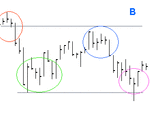roguetrader
Senior member
- Messages
- 2,062
- Likes
- 49
Thanx GJ that was helpful, when I used the word "familiar" it was in relation to the term "arbitrage" not the actual tactics employed by such a trader., I also pointed out that this practise may have other forms or definitions which you have elaborated on.GammaJammer said:Not all arbitrage is instant. Also not all arbitrage is zero (or negligible) risk. That rather depends on the nature of the market(s) that you are dealing with. If you're talking spot FX then yes, it's to all intents and purposes instant and reasonably risk free (assuming you get done on all three sides of the trade of course). The Simex / Osaka N225 Futures play that Leeson was doing is another example of this.
But there are other forms of arbitrage, many involving assets that are almost but not quite the same, or option related plays. Examples of this would include some convertible bond trading strategies (and indeed some vanilla bond plays as well).
To be honest lots of this stuff is kind of outside the scope of most discussions on T2W. The 'arbitrage' to which most people refer on these boards is indeed the simple plain old simultaneous trade virtually risk free type.
Just a bit of background info. Hardly exhaustive but hope it helps.
GJ
As regards Mr Leeson, that was exactly what I was saying.
Just to clarify, JumpOff. the arbitraging activities of Nick Leeson were not what caused his demise.


